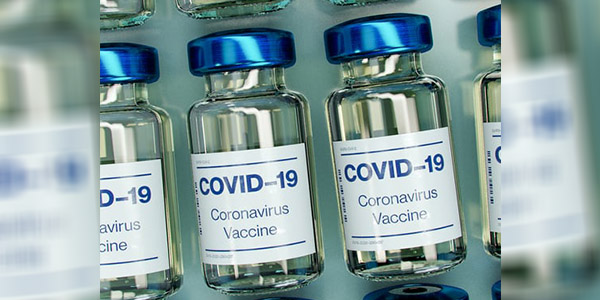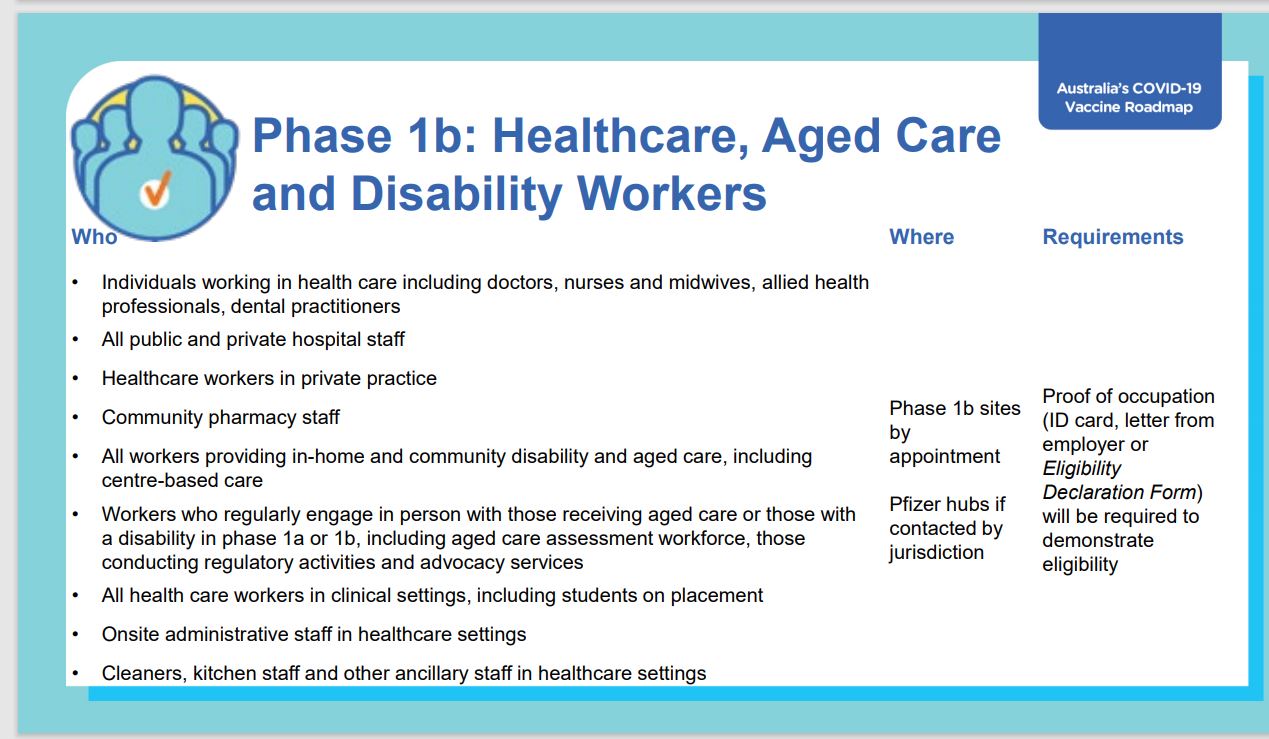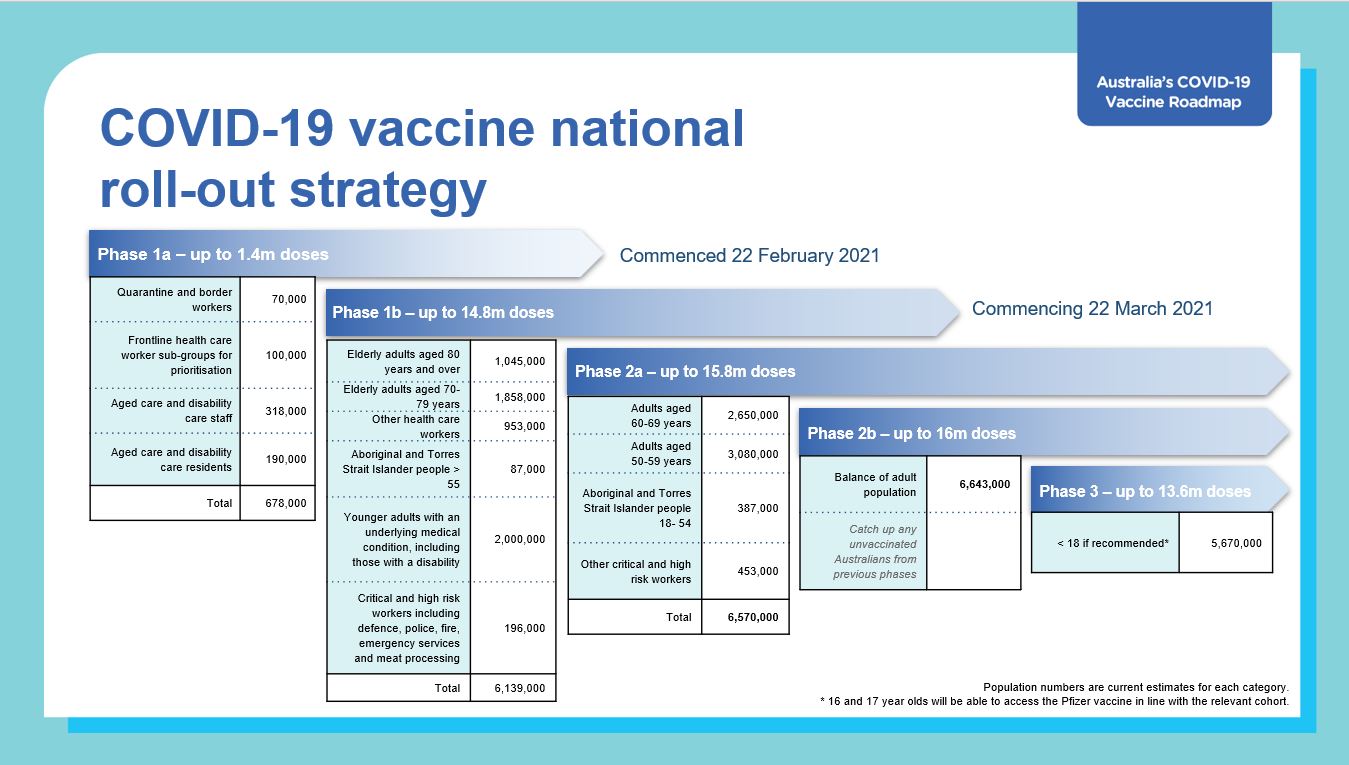1:30min

Photo, Daniel Schludi, Unsplash
UPDATED 19 March, 2021
By Helen Carter
Journalist
Health care workers not working on the frontline including optometrists will be second in line for the COVID-19 vaccination, expected to roll out from next Monday, March 22. The Department of Health has provided a nationwide list of where you can get the vaccine.
Optometry Australia’s General Manager, Policy, Skye Cappuccio said: ‘The Commonwealth Government has announced that ‘other health care workers’ – those who are not working on the ‘frontline’ – will be amongst the second tranche of the first phase of people to receive vaccinations.’
Additional advice sought from the Department of Health also clarified that ancillary staff (including administration staff and optical dispensers) will also be eligible to receive the vaccine under Phase 1b. Health-care workers have been advised they will need to provide proof that they are a health-care worker. Ancillary practice staff are also advised to take proof of their role in a health-care practice to their appointment.
On March 16, the Australian Government’s Department of Health provided a nationwide list of where you can get the vaccine You can search via your postcode.
AHPRA and the National Boards released a joint position statement on 9 March “strongly encouraging all registered health practitioners and students (particularly those undertaking placements in various practice settings) to have the full COVID-19 vaccination course as scheduled unless medically contraindicated.”
The statement advises that optometrists will need to actively seek vaccination and prove that they are optometrists.
Phase 1a vaccination is currently underway and includes allied health professionals including optometrists who routinely provide care in aged care and disability care settings.
On Saturday March 6, the Department of Health uploaded a powerpoint presentation to its website detailing priority groups for its COVID-19 vaccination program: Phase 1b.
The powerpoint said Phase 1b would commence on March 22 and vaccinate up to 935,000 ‘other health care workers’ on top of the 100,000 frontline health care workers who are currently being vaccinated in phase 1a.
The ‘other health care workers’ will be part of 6.1 million Australians being vaccinated in phase 1b.
The powerpoint states these will be ‘health care workers currently employed and not included in phase 1a’ including:
|
 |
Source: Australia’s COVID-19 Vaccine Roadmap, Australian Government Department of Health, Priority Groups for Vaccination Program Phase 1b powerpoint, updated March 18, 2021 www.health.gov.au |
The information states that these vaccinations will take place at Phase 1b sites by appointment or Pfizer hubs and health care workers will need proof of occupation (including an ID card or letter from their employer) to demonstrate eligibility.
GP practices and respiratory clinics to administer vaccine
More than 4,000 accredited general practices will participate in phase 1b of the rollout, Minister for Health and Aged Care Greg Hunt announced on March 7.
‘More than 1,000 general practices will commence from the week of 22 March 2021, with a rapid scale up over the following four weeks. This will ensure an efficient and equitable distribution of vaccines across the country,’ Minister Hunt said.
The staged commencement of general practices will be complemented by GP-led Respiratory Clinics and Aboriginal Community Controlled Health Services working together to deliver vaccines to eligible priority populations.
You can look up via your postcode where to get the vaccine at this Department of Health nationwide list of where you can get the vaccine
Nationally, more than 130 Respiratory Clinics and over 300 Aboriginal Community Controlled Health Service sites will support the phase 1b roll out. This adds to more than 5,000 points of presence across Australia in addition to vaccination clinics set up by states and territories.
Health care workers being vaccinated in phase 1b will be part of a group to receive 14.8 million doses including people aged in their 70s and 80s (who are not aged or disability care residents), Aboriginal and Torres Strait Islander people aged over 50, people over age 18 with an underlying medical condition including disability, and critical and high-risk workers currently employed including defence, police, fire, emergency services and meat processing workers.
GET READY FOR YOUR VACCINE
The Australian Government advises the below advice to Get ready for your COVID-19 vaccinations – Services Australia. There are three steps you can take now to get ready:
- create a myGov account and link Medicare
- check your contact details for Medicare are up to date. You can view and update your contact details using your Medicare online account or the Express Plus Medicare app. Sign into your account through myGov or the app and select personal details.
- view your immunisation history statement.
Watch a video at this link on how to get ready for the rollout.
How to get proof of your vaccination
Your immunisation history statement will record your COVID-19 vaccines. You can use this as proof of your COVID-19 vaccination status. Get your immunisation history statement using your Medicare online account through myGov or the Express Plus Medicare mobile app.
If you’re not eligible for Medicare you can still get the COVID-19 vaccine. You can request an Individual Healthcare Identifier to get an immunisation summary through My Health Record.
Australia’s Chief Nursing and Midwifery Officer Professor Alison McMillan answers the top three questions (below) the public has been asking recently about the vaccination on the government’s social accounts, in this video Top 3 COVID-19 vaccine questions – Vaccine administration process, face masks and breastfeeding | Australian Government Department of Health
- What is the process of administering the COVID-19 vaccines? The vaccine is an injection in your arm. When your appointment time comes, take photo ID with you if you have it, a Medicare card, information about the medications you take, anything about your particular health issues, whether you’ve got a bleeding disorder or other information you feel is important. The health professional who does your vaccine will do a consent form and check these things. It is really important if you’ve got any history of anaphylaxis or an allergic reaction to a vaccine, you must tell the health professional; it won’t stop you from getting the vaccine, but they can take additional measures to protect you. If you have had other vaccines in recent weeks you must tell them what you’ve had so they can prepare you appropriately for your vaccine.
- Will I still need to wear a face mask once I’ve received the vaccines? The vaccine prevents severe disease and death. We are still learning how it affects the transmission of COVID between people. If you can’t socially distance, or particularly when travelling on public transport, even perhaps where in the place you live you are required to wear a mask, we encourage you to do so. It will help protect you and others from COVID, and it is those places where you cannot properly social distance.
- Is it safe to breastfeed once I’ve received the COVID-19 vaccines? It is. It is important as you get your vaccine to tell the health professional that you are breastfeeding, but it is safe to you and your baby to have the vaccine and continue to breastfeed. We encourage as many women to breastfeed their babies as long as they can, due to the extra protection it provides for a range of conditions and diseases.
Allied health staff in aged and disability care qualify for priority vaccination
Allied health professionals who routinely provide care in aged care and disability care settings qualify under phase 1a for priority vaccination along with nursing, personal care and other staff in these settings.
Others receiving vaccination under Phase 1a include quarantine and border workers, frontline health care workers (i.e. those working directly with COVID-19 positive patients or potential patients) in hospitals and respiratory clinics and GP respiratory clinics, ambulance officers and paramedics, some laboratory staff, and staff and contractors working in residential aged care facilities and disability group home settings.
On Monday, March 8 the Department of Health also uploaded on its website a vaccine eligibility checker for individuals to see when they can book a COVID-19 vaccine. Vaccines will be available to different groups in Phase 1a, Phase 1b, Phase 2a, Phase 2b and Phase 3 at different times.
Everyone in Australia will be offered a safe and effective COVID-19 vaccine. Australia now has two approved for use from AstraZeneca and Pfizer. The Pfizer/BioNTech vaccine has been provisionally approved by the Therapeutic Goods Administration (TGA) for people 16 years and older and the AstraZeneca vaccine has been provisionally approved by the TGA for people 18 years and older.
People can Learn more about the vaccination phases and eligibility and Learn more about COVID-19 vaccines and the vaccination program
Source: Australia’s COVID-19 Vaccine Roadmap, Australian Government Department of Health, Priority Groups for Vaccination Program Phase 1b powerpoint, updated March 8, 2021 www.health.gov.au
Covid vaccinations, laws and the workplace
Many employers are seeking clarity on whether they can require their employees to obtain the coronavirus vaccine. The answer, according to our lawyers Industry Legal Group, is currently that it depends on the facts, taking into account the particular workplace and each employee’s individual circumstances.
While the Australian Government aims to have as many Australians as possible vaccinated, receiving a vaccination is currently voluntary. According to the Fair Work Ombudsman there are relevant factors employers should consider when determining whether they may require their employees to be vaccinated against coronavirus.
Members can read information about this from our lawyers on our COVID HR FAQ page.
The AHPRA statement said: ‘As health practitioners and students are members of the general community, vaccination will contribute to achieving the highest possible level of immunity across the community, and will provide practitioners and students with a level of protection for their own health if exposed to the novel coronavirus that causes COVID-19.
‘Regardless of their own vaccination status, health practitioners must ensure that there are appropriate measures in place in their practice to manage any risk of transmission of the novel coronavirus that causes COVID-19 to patients, colleagues and the community.
‘In the case of a conscientious objection about receiving, authorising, prescribing or administering COVID-19 vaccination, practitioners must inform their employer and/or other relevant colleagues (where necessary) of their objection as soon as reasonably practical.
‘For example, a practitioner’s personal beliefs may form the basis of a conscientious objection to particular treatments. In addition to the above, it is important that practitioners inform their patient or client of their conscientious objection where relevant to the patient or client’s treatment or care.
‘While some health practitioners may have a conscientious objection to COVID-19 vaccination, all practitioners, including students on placement, must comply with local employer, health service or health department policies, procedures and guidelines relating to COVID-19 vaccination.’
The AHPRA statement also warns ‘any promotion of anti-vaccination statements or health advice which contradicts the best available scientific evidence or seeks to actively undermine the national immunisation campaign (including via social media) is not supported by National Boards and may be in breach of the codes of conduct and subject to investigation and possible regulatory action.’
Tagged as: COVID-19


